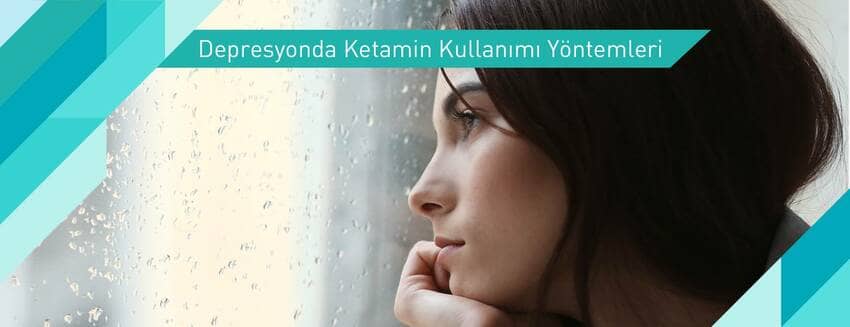
Ketamine works well in resistant depression
Introduced 50 years ago as an anesthetic drug, Ketamine is used in the treatment of many psychiatric diseases, especially resistant depression. It was stated that Ketamine provides 60-65% success in resistant depression cases that do not respond to treatment.
Üsküdar University NPISTANBUL Hospital Psychiatry Specialist Asst. Assoc. Prof. Dr. Semra Baripoğlu said that positive results were obtained with Ketamine, which is used in the treatment of psychiatric diseases such as major depression, bipolar disorder-depressive episode, postpartum depression, Post Traumatic Stress Disorder (PTSD), Obsessive Compulsive Disorder (OCD), anxiety disorders and fibromyalgia.
Assist. Assoc. Prof. Dr. Semra Baripoğlu stated that Ketamine was developed 50 years ago as an anesthetic drug and is still used in surgeries and emergency rooms and said, "In the last 10 years, researchers and psychiatrists have presented studies showing the effectiveness of Ketamine as a fast-acting drug in severe depression. The FDA has not yet approved the routine use of this drug in the treatment of depression, so it is still used off-label/off-label. However, since clinical trials have shown that patients benefit from it, it continues to be used in an increasing number of Ketamine Treatment Centers.
60-65 PERCENT SUCCESS RATE
Stating that ketamine treatment is still a very unknown treatment, Asst. Assoc. Prof. Dr. Semra Baripoğlu stated that successful results have been obtained and said, "Clinical studies report that on average, 65% of patients experience a reduction in the severity of depression symptoms by half 24 hours after the first application, and that this improvement becomes permanent after 6-10 sessions of serial application."
USED IN CASES THAT DO NOT RESPOND TO TREATMENT
Stating that as a hospital, they have started Ketamine treatment for 2-3 years, and since the beginning of 2017, they have been applying it in more patients with the increase in supporting scientific data, Assist. Assoc. Prof. Dr. Semra Baripoğlu said, "In our clinic, we apply it both in our inpatients and outpatients, primarily in resistant depression patients who do not respond to medication and other treatments. Depression is a very painful process for the patient. Since resistant depression cases that do not respond to medication and other treatments are very challenging, there is a constant search for new treatments. Brain stimulation techniques, such as magnetic stimulation therapy, were born out of these searches. Again, deep brain stimulation came to the agenda after these searches. Serial Ketamine Infusion Therapy is a new treatment approach put into practice at the end of such a search."
DETAILED EXAMINATION IS PERFORMED BEFORE TREATMENT
Stating that the amount of medication given to the patient is determined according to the weight of the person, Assist. Assoc. Prof. Dr. Semra Baripoğlu said, "In addition, blood tests showing the age, gender and liver condition are performed. We also have to take into account the other medications the patient is taking. Because other drugs can increase the side effects that Ketamine can cause in the first 24 hours. We make the necessary adjustment by paying attention to all these."
Stating that they make a detailed psychiatric examination and evaluation of the patient before ketamine treatment, Assist. Assoc. Prof. Dr. Semra Baripoğlu said, "We give the patient detailed information about the treatment and have them sign an informed consent form. We start the treatment after the evaluation of the internal medicine and anesthesiologist.
THE PERSON IS NOT PUT TO SLEEP IN THE TREATMENT
Stating that they apply ketamine to patient groups defined as depression resistant to standard treatment, Assoc. Prof. Dr. Semra Baripoğlu said, "There is a certain international protocol for the use of this drug. Ketamine is normally an anesthetic substance. In this treatment, a much lower dose is used than the dose used in anesthesia. The person does not sleep during the application. A very low dose is administered intravenously in serum over a period of 45 minutes. Ketamine has a rapid antidepressant effect. In many studies, it is stated that immediately after the first application, there is an increase in the patient's mood and morale, a regression in suicidal tendency, that is, a state of well-being."
Stating that ketamine treatment is applied very carefully in selected patients, Asst. Assoc. Prof. Dr. Semra Baripoğlu said, "The critical patient group is depression patients who do not respond to standard treatments. What is the most important problem in these patients? "Suicidal tendency, decline in professional, academic and social functioning." If the depression picture is eliminated with Ketamine treatment, all the negative consequences of depression will disappear. We apply it 2-3 times a week, a course of treatment consists of 6-10 sessions. At the end of the application, the patient can describe that they are in a normal mode, revitalized and have a desire to do something."
If we talk about a sample patient in whom ketamine treatment was used; "This depression patient has been experiencing a serious reluctance for about a year, he cannot go to work. When he first came to us 9 months ago, he was sitting on the couch in front of me like a nugget. His speech and movements had slowed down. This person did not feel the strength to move a finger. He spent the whole day at home, and he had an intense reluctance, even from activities he would enjoy. He spent a significant part of the daylight hours asleep or in bed. He had no suicidal tendencies, but in other cases there can be serious suicidal tendencies." Our patient described a significant improvement in her depressive complaints within 24 hours after the first 1-2 treatments, and when we completed all sessions, she reported that her complaints had permanently regressed by 60%. "
